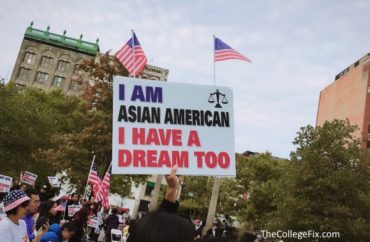
OPINION: Harvard is only as powerful as Asian Americans let it be
The Asian community’s love of Harvard University is unrequited.
Harvard’s admissions process relies on racial discrimination, unfairly targeting Asian applicants.
Asian students who have spent their entire academic careers building incredibly impressive
applications are then told that they are not the right fit for Harvard, not because they are not
intelligent enough — but simply they are Asian and Harvard has already filled that quota.
Regardless of this systemic discrimination, Asians remain fixated on Harvard as the pinnacle of success.
Take Harrison Chen, a Vanderbilt undergrad who is determined to get into Harvard Law. It
“would be a dream come true. They can’t say ‘Harrison, you don’t have what it takes,’ I would
flash my badge or whatever in front of me, and then they’d shut up. I don’t know, that’s what
just goes on in my head.”
Harrison is motivated by the thought of getting into Harvard. Yet, the elite sphere of American society is unfortunately not a meritocracy, as Harrison knows himself — he got rejected by nine out of 13 elite colleges to which he applied, including Harvard for undergrad, even with a 1560 SAT and 5.44 grade-point average.
Asian-American success — their academic success, in particular — is often perceived as a threat by progressives and elite liberal establishments. Instead of honoring the tradition of meritocracy, these individuals view Asian-American success as a threat to their own standing and wish to suppress it instead of embracing its benefits.
Regardless of how many times Harvard is taken to court, the institution has no incentive to stop discriminating based on race as long as the Asian community remains fixated on it.
Harvard is often perceived as a progressive haven, however, it has been discriminating based on race for the past 300 years. Their discrimination continues today, this time targeting Asian applicants. When are we going to hold Harvard accountable for its actions? pic.twitter.com/35xCvhg8Ap
— Kenny Xu (@kennymxu) July 10, 2021
This fascination is incredibly harmful for a multitude of reasons but especially because it provides Harvard with more leverage over specific demographics that they deem to be undesirable. As long as the Asian community remains infatuated by the Ivy Leagues, it will become easier and easier for such schools to continue practicing racial discrimination without facing real consequences in the name of talented Asian-American students choosing other universities.
Instead of fixating on Harvard, Asians should turn their attention to the countless other admirable schools that actually want to accept them and genuinely value them as both students and individuals. Spending all of one’s time pining after a school that is stacked against them from the beginning does not equal success. Harvard should not define anyone’s success and it is vital for the Asian community to accept this.
Harvard is only as powerful as Asian Americans let it be.
Asian Americans have a long history of battling discrimination. Arguably, two of the most infamous instances of anti-Asian prejudice are the Chinese Exclusion Act of 1882 and the 1942 Executive Order 9066, in which President Roosevelt introduced internment camps during the second World War.
One might think that in today’s society, we would have moved past this sort of blatant racism, yet the envy and resentment that belies some of this discrimination continue to manifest themselves in subtle ways — surprisingly, in the elite sphere. Asian Americans continue to face discrimination today, most notably in the form of faulty college admissions methods designed to limit the amount of Asian applicants accepted. Instead of accepting this reality, however, maybe it’s time we reject Harvard.
As I note in my upcoming book, “An Inconvenient Minority,” “Asian Americans, largely without historical wealth or social connections … disproportionately rely on their merit, their skills and talent, to move along in society.”
Despite this culture of excellence, historic discrimination suppressed Asian skillsets, and many grew up poor, isolated in ghettoized Chinatowns and enclaves on the West Coast during the period of 1870 to 1950. The end of legal discrimination in the 60s, however, unleashed a whirlwind of talent into the marketplace. Asian Americans started businesses, they went into every industry, and they built the American dream for themselves.
How? In her book “Battle Hymn of the Tiger Mother,” Amy Chua explains that Chinese parents believe that “the best way to protect their children is by preparing them for the future, letting them see what they’re capable of, and arming them with skills, work habits, and inner confidence that no one can ever take away.”
At the extreme, which represents only a fraction of Asian parents, is the “tiger parent.” “Tiger parenting” refers to the practice of pressuring children to reach their highest academic potential via extracurricular activities, high test scores, and acceptance into top schools.
Parents always want what’s best for their children; they always want their children to be able to build upon their own successes. This concept is incredibly important especially in regard to immigrant parents.
For Asian immigrants, “the best” is acceptance into the Ivy Leagues, particularly Harvard. The Asian community in general views Harvard as the epitome of success; acceptance into Harvard is their American dream. An acceptance letter from Harvard means that they have made it to the top.
“Whenever I see throngs of Chinese tourists jostling to take pictures with the John Harvard statue, I am reminded of the Buddhist temples in China that I sometimes visited as a child,” says Zara Zhang, Harvard class of 2017. “Touching the shiny tip of John Harvard’s shoe is almost akin to crouching in front of a golden Buddha—in both cases, worshippers are paying respect in the hope that the act will bring them good luck.”
Kenny Xu is the author of “An Inconvenient Minority,” which exposes racial discrimination against Asian Americans at elite colleges like Harvard and Yale. He is the president of Color Us United, which advocates for a race-blind America in the midst of racial division.
IMAGE: The College Fix
Like The College Fix on Facebook / Follow us on Twitter





Please join the conversation about our stories on Facebook, Twitter, Instagram, Reddit, MeWe, Rumble, Gab, Minds and Gettr.